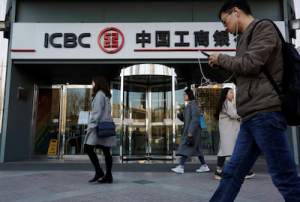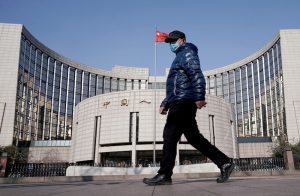(AF) Investors managing $11 trillion in assets have called on banks to set tougher emissions targets ahead of a meeting of world leaders aimed at accelerating efforts to fight climate change.
The group, which includes Pimco, the world’s biggest bond investor, and Legal & General Investment Management, the UK’s biggest asset manager, said they wanted lenders to enhance pledges to decarbonise their lending books.
While a number of the world’s biggest banks have already said they have an ‘ambition’ to reach net zero greenhouse gas emissions by 2050, many have yet to specify how they plan to do so and continue to fund heavy emitting activities.
“The problem we face today is that too many banks are failing to consider climate harm when they make financing decisions, and too much money is being ploughed into carbon-intensive activities that we so desperately need to move away from,” Natasha Landell-Mills, head of stewardship at Sarasin & Partners, told Reuters.
As the US gears up to host the April 22-23 Leaders’ Summit on Climate, the investor group said it wanted banks to speed up their efforts, including by setting interim targets to get to net-zero emissions by mid-century or sooner.
Bank remuneration committees should also ensure that variable pay is tied to hitting the targets, they added, while material climate risks should be included in the lenders’ published accounts.
A number of banks have already said they plan to increase investment in green energy and other activities that will help in the transition to a low-carbon economy, but the investor group said more was needed and the spend should not be considered as offsetting lending to dirtier projects.
The group of 35 investors, operating through the Institutional Investors Group on Climate Change, said it had opened talks with 27 of the world’s largest banks and expected to expand the list over time.
INCREASING SOPHISTICATION
Global investors apply increasingly sophisticated portfolio-construction techniques to stress-test the impact of a low-carbon economy on their investments, Fitch Ratings said.
Corporate issuers with larger carbon footprints are under increasing pressure to decarbonise in order to maintain access to financing, the global rating agency added.
“Portfolio managers have been moving away from simple screening, exclusion and engagement techniques, which limit their ability to invest in new securities of issuers generating a significant share of revenues from carbon-intensive operations, such as coal or oil and gas,” it added.
As investment portfolios may already hold securities that breach these limits, some investors may have flexible policies that allow keeping such investments under certain conditions, such as if they have credible decarbonisation plans or capital reallocation into low-carbon assets.
More sophisticated techniques include factoring in the impacts of sector and business model disruptions caused by climate-related drivers.
“Such changes may affect the profitability, liquidity, solvency and refinancing risks of issuers,” Fitch said. “These portfolio-level approaches help the investment industry mitigate long-term, transitional, and physical climate risks.”
• George Russell with Reuters
This report was upgraded on February 22. 2022 to meet new style standards.
ALSO SEE:
China to launch national emissions trading scheme in mid-2021
PBoC outlines shortcomings in China’s carbon trading scheme
























